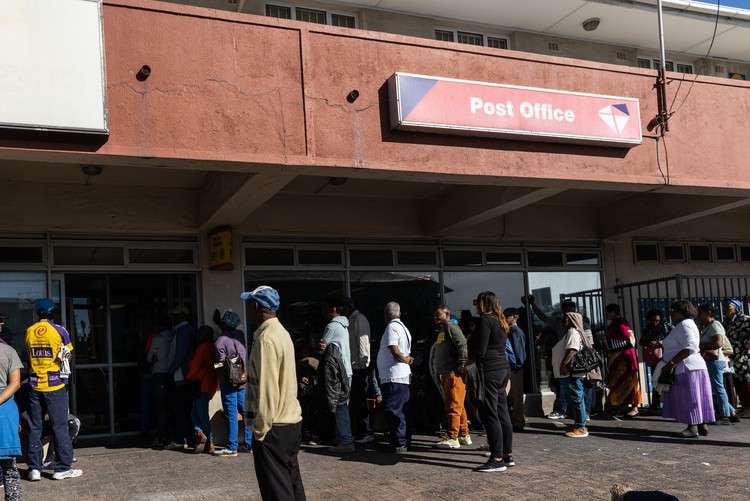
2 October 2025
About three million SASSA grant beneficiaries receive their grants through Postbank. Archive photo: Ashraf Hendricks
The South African Social Security Agency (SASSA) has extended its Master Services Agreement (MSA) with Postbank by a further three months.
“This is to allow the executive authority time and space to deliberate on various issues from the two entities, and to give guidance,” SASSA spokesperson Paseka Letsatsi said on Wednesday. The contract was supposed to lapse on Tuesday, 30 September.
In December 2023, SASSA gave Postbank six months’ notice to terminate the contract, citing a breakdown in the relationship between the two state entities as well as reputational risks caused by Postbank’s shortcomings. The notice was later withdrawn, but in March 2024, SASSA issued a new 18-month termination notice, set to end on 30 September 2025.
However, weeks before the contract was set to end, Postbank filed an urgent application at the Gauteng High Court in Pretoria to stop SASSA from terminating the MSA, pending the outcome of a formal dispute resolution process between the two entities. Judge Colleen Collis struck the matter from the urgent roll, finding the urgency to be “self-created”.
Following that ruling, Postbank indicated its intention to approach the Constitutional Court for urgent relief. The bank accused SASSA of undermining the agreed dispute resolution process. It said that after many attempts to resolve their differences had failed, Postbank declared a formal dispute in July 2025 and proposed a CEO-level meeting. SASSA then suggested the matter be addressed by an Inter-Ministerial Committee, but those meetings have yet to be held.
Late on Tuesday, Postbank announced that the MSA would continue unchanged, pending the outcome of the Committee’s discussions.
The MSA was introduced in 2018 to protect social grant beneficiaries’ accounts from bank charges and unauthorised deductions, which had been widespread under the previous contractor. Under the MSA, Postbank recovers social grant transaction costs through payments from SASSA, rather than charging beneficiaries bank fees.
Since 2020, Postbank’s social grant customers (excluding the R350 SRD grant recipients) have plunged from 8-million to 2-million, as late payments and a chaotic card swap process urged customers to switch to private banks.
The bank has warned in court papers that without the agreement, it would eventually have to start charging beneficiaries monthly service fees: R7 for account maintenance, R2 for balance enquiries, R14.56 for ATM cash withdrawals, R22 for a three-month bank statement, and R80 per replacement card.
On the extension, Postbank CEO Nikki Mbengashe said, “This brings certainty and reassurance to millions of social grant beneficiaries who will continue to use their Postbank Black Cards and SASSA Gold Cards with confidence, enjoying uninterrupted access to their grants and associated banking benefits.”
Meanwhile, Black Sash advocacy manager Hoodah Abrahams-Fayker said the organisation remains concerned about the implications for social grant beneficiaries and for payments to continue uninterrupted. This has been an ongoing challenge for recipients served by Postbank, “which SASSA highlighted as reasons for the termination”, Fayker said.
She said Postbank is yet to share how it plans to address these challenges. “Black Sash is worried that beneficiaries may be compelled to turn to private banks where there is no subsidising of fees and charges. Every time, beneficiaries bear the brunt of ongoing challenges with the administration and payment of grants,” Abrahams-Fayker said.